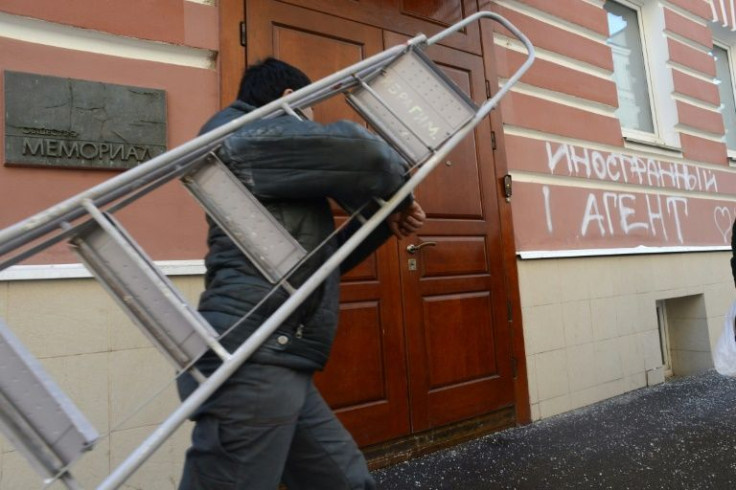Concern Mounts Over Threat To Shutter Top Russian Rights Group
Concern mounted Friday over Russian prosecutors' move to close top rights group Memorial, with the presidential council sounding the alarm and campaigners warning its closure would be a "devastating blow" to civil society.
On Thursday, Memorial said it was notified by Russia's supreme court that prosecutors had filed a demand to dissolve the group over systematic violations of "foreign agent" legislation.
In a new salvo announced Friday, Moscow prosecutors were also moving to shut down Memorial's Human Rights Centre over alleged "repeated" constitutional violations and purported justification of "terrorism and extremism".
The pressure on Memorial comes amid an unprecedented crackdown on the opposition and independent media in Russia, with authorities imprisoning Russia's top opposition politician Alexei Navalny earlier this year.
Founded in 1989 by rights activists including renowned scientist and Soviet dissident Andrei Sakharov, Memorial has been in the cross-hairs of the Russian authorities for years.
The organisation, which has been regularly cited as a potential Nobel Peace Prize winner but never won, campaigns for the preservation of historical memory in Russia and against rights violations.
The presidential rights council, which usually toes the Kremlin's line, said the request to shut down Memorial was unjust and "not commensurate" with the violations.
The council said in a statement it "considers the right to association a very important value and believes the forced dissolution of the oldest public organisation to be an extreme measure".
"The council is monitoring the situation with concern, conducting consultations and will take steps to settle the situation around Memorial," the statement added.
The secretary general of rights body the Council of Europe, Marija Pejcinovic Buric, urged Russian prosecutors to reconsider, saying the closure of Memorial "would deal a further devastating blow to civil society, which is an essential pillar of any democracy".
German Foreign Minister Heiko Maas labelled the news "troubling" and hailed the group's "courageous, tireless work" in the interests of the Russian people.

The Memorial Human Rights Centre was put on the government's register of "foreign agents" in 2015. The international branch of the human rights group was added a year later.
A term laden with Soviet-era connotations of treachery and espionage, the label forces individuals or organisations to disclose sources of funding and label all their publications, including social media posts, with a tag or face fines.
Memorial rejected claims it was violating the Russian legislation or justifying terrorism and extremism as "absurd." A preliminary hearing into the Moscow prosecutors's case is scheduled for November 23.
Separately, the Prosecutor General's Office is seeking to shutter the international branch of Memorial over violations of the "foreign agent" legislation. A hearing is scheduled for November 25.
Memorial gained prominence for chronicling the victims of Communist repression -- a painful subject that modern Russia has been reluctant to address -- and investigating executions and kidnappings committed against civilians during Moscow's two wars to subdue Chechen separatists.
This year Memorial and several other groups released a report on Moscow's role in the Syria campaign and urged Russians to take responsibility for abuses in the war-torn country.
"The Russian authorities' move to extinguish one of the oldest and most influential human rights groups in the country demonstrates their relentless determination to end all ongoing human rights work in Russia," said Marie Struthers, Eastern Europe and Central Asia Director at Amnesty International.
Last month Memorial listed at least 420 political prisoners, including Kremlin critic Navalny who survived a poisoning attempt with Novichok nerve agent last year. Russia has outlawed Navalny's organisations as extremist.
Memorial also lists members of religious minorites among Russia's political prisoners, including the Jehovah's Witnesses outlawed as "extremist" in the country in 2017.
Sergei Davidis, head of a political prisoners' support program at Memorial, said the organisation had never justified terrorism and extremism.
"We do not agree that some kind of peaceful activity is terrorist or extremist in nature," Davidis told AFP.
© Copyright AFP {{Year}}. All rights reserved.





















